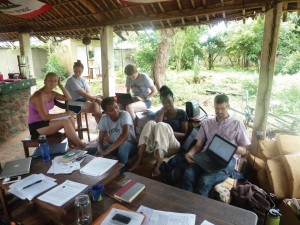Until the 1950s, cervical cancer killed more American women than any other type of cancer. Widespread screening has drastically decreased the number of those deaths in the United States, but in the West African country of Senegal, the disease remains prevalent.
To Andrew Dykens, a professor of family medicine at the University of Illinois at Chicago (UIC), the situation is especially galling given how easy this form of cancer is to catch.
“Cervical cancer develops very, very slowly,” Dykens says. “There are five to 15 years from the first cellular changes to the actual cancer development. So you’ve got time during that phase to do something about it.”
That’s exactly what he’s doing, with the help of the Peace Corps, Rotarians, and UIC.
Dykens – who is a member of the Rotary Club of Chicago, the director of the Global Community Health Track at UIC’s Center for Global Health, and a former Peace Corps volunteer – is bringing together those organizations and Senegal’s Ministry of Health and Social Action to reduce the number of women who die from this highly treatable disease.
A bit of background: In 2010, Dykens launched Peace Care, a nonprofit that helps communities and organizations work together to bring resources where they are needed. “It dawned on me that the Peace Corps should be working more closely with, for example, academic centers, because these centers have technical expertise but don’t have a footprint in local settings,” he says. “Meanwhile, the Peace Corps has people who are extraordinarily knowledgeable about the local context.”

Training for health care workers in Kedougou. Photo Courtesy Andrew Dykens.
And Rotary? “Rotary loves to build capacity,” he says. “If we can build the capacity to implement evidence-based solutions that already exist, we don’t need fancy tools like MRIs or robotic surgery. Not that those tools aren’t good, but there’s a basic level of access to primary health care that doesn’t exist.”
After hearing from Peace Corps staff in Senegal about the need for cervical cancer screenings there, Dykens and Peace Care started training health workers in the Kedougou region of the country to detect abnormal cervical cells via a simple but effective method. A vinegar solution, dabbed onto the cervix, reveals abnormal cells that can be killed immediately with a cryotherapy gun and CO2tank – no electricity required. This is far easier and less expensive than the standard Pap test, which requires looking at cell samples under a microscope to identify abnormalities.
“Cool, right?” Dykens says. “This technique has been around for decades, and it costs so little and saves women’s lives. So how is it that in this day and age, in Senegal, there are 10 rural regions that have no access to cervical cancer screening?”
Part of the answer is local influence. “In some cases, the local opinion leaders are very conservative on women’s issues, and they are reluctant to help the women go for consultation,” says Manuel Pina, an obstetrician/gynecologist and member of the Rotary Club of Dakar-Soleil who is working with Peace Care. “But Rotarians are also opinion leaders. We have already done local talks on the importance of this project, to help end all of the rumors and bad information linked to cervical cancer.” Pina notes that they also encourage families to have their daughters vaccinated against human papillomavirus, which causes cervical cancer.
Rotarians and Peace Corps volunteers have a long history of working together on projects, and in 2014 the two organizations began a more formalized partnership. The cervical cancer screening project demonstrates how a grassroots effort can benefit from the combined strengths of the two organizations.
The Rotary clubs plan to apply for a Rotary Foundation global grant to help expand cervical cancer screening services to the Tambacounda region. “Not just for the purpose of building capacity, but also to build a training center for cervical cancer screening,” Dykens says. Eventually, that center could also train health workers to screen for and treat other diseases, such as diabetes, hypertension, and other types of cancers, he adds.
Dykens says support of Rotarians in the United States and in Senegal will continue to be key.
“Rotarians do things right,” he says. “They work systematically and always engage local voices and perspectives, and that is what ultimately creates success. Rotary has worked a long time on polio and done an amazing job. And in my mind, access to primary care is the next polio.”

Leave A Comment
You must be logged in to post a comment.